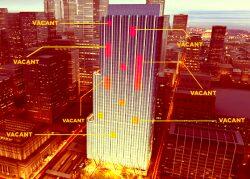Chicago’s commercial property market is in the deep freezer. Tough lending and economic conditions had many commercial property owners and investors hitting the pause button last quarter.
Commercial property sales in Chicago during the first three months of this year were down by more than half from the same period in 2022, according to the latest estimates by MSCI Inc. The investment research firm tracked about $2.7 billion in investment property sales during the first quarter, compared with more than $5.9 billion in the first quarter of 2022.
The office and industrial sectors were among the hardest hit, with each seeing drops in sales volume of more than 70 percent. Meanwhile, transaction volume for retail properties nearly held steady, dropping by about 7 percent.
At least one factor is lenders being more hesitant to issue loans tied to commercial real estate.
“I wouldn’t call them pencils down, but they’re very restrictive on what they’re doing right now,” Danny Spitz, CEO of the commercial brokerage Greenstone Partners, told The Real Deal.
Another is the Federal Reserve’s interest rate hikes, which it opted to pause Wednesday.
“That really impacts the pricing that people can achieve,” Integra Realty Resources’ Ron DeVries said. “If you’re not in a position that you have to sell, people are just choosing to hold right now.”
DeVries noted that the slowdown in Chicago is consistent with what’s happening nationally.
Higher costs of borrowing coupled with office tenants pushing back decisions about whether to stay or go regarding their current leases has made investors hesitant, too, said Jaime Fink, who leads JLL’s Chicago capital markets division.
“The uncertainty surrounding office tenant demand and what office tenants want to do has caused investors to underwrite more conservatively. The conservative underwriting coupled with higher cost of capital in the office market has led to a decrease in prices. When prices decrease, fewer owners want to transact,” Fink told The Real Deal.
Lower sales volume for office properties, which totaled about $422 million last quarter compared to $1.5 billion in the first quarter of 2022, is also a function of tenant demand. Downtown Chicago’s office market is staring down a record-high vacancy rate and a surplus of sublease space.
“Is there demand for office space? Yes, there is. The demand is not at the extent it was prior to the pandemic, but some of that is due to office tenants trying to figure out what they want to do on a go-forward basis,” Fink said. “That may be a better location or a newer property or a combination of both.”
He noted that while office leasing activity has improved over the last few quarters, investors are still taking a break from transacting to gauge where valuations land.
“A lot of investors are trying to see where pricing’s going to shake out,” Fink said.
Pricing expectations also likely contributed to last quarter’s drop in industrial sales volume to a total of $484 million, down from $2.2 billion during the first three months of last year. A separate first-quarter report from commercial brokerage NAI Hiffman attributed the slump in investment volume to “a disconnect between seller expectations and buyer values caused by rising interest rates.”
Somewhat sheltered from the storm were the retail and multifamily sectors. Retail investment sales dropped by about 7 percent, to about $452 million, while apartment building sales were down by 31 percent, totaling $763 million.
Spitz said the drop in retail transactions was tied to a lack of supply rather than retail fundamentals pointing downward.
“There’s a lack of transactions because a lot of people are locked into debt that’s cheap,” he said. “There’s no reason to sell.”
Across the board, commercial sales brokers expect the pace to pick back up once investors feel more buyers and sellers close gaps on pricing negotiations.
“What everyone is looking for right now is certainty,” DeVries said.
Read more



